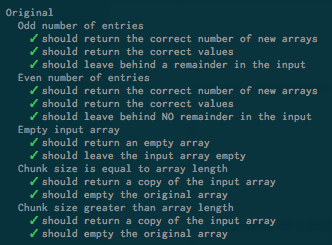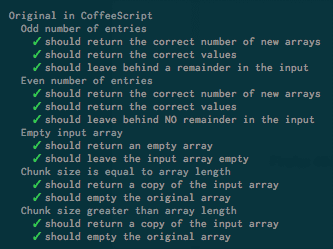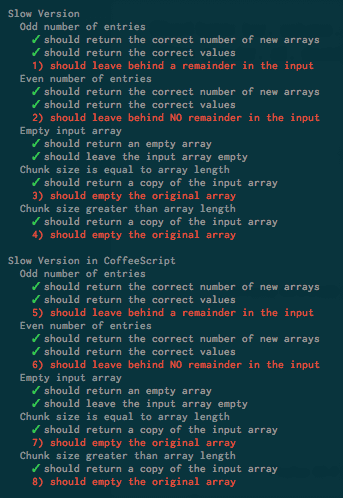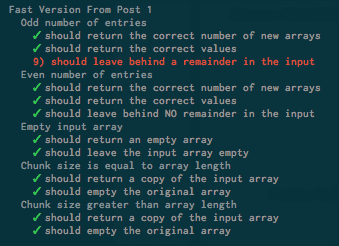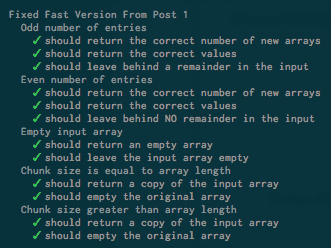Will Stamper’s Blog
Can We Do It Better?
June 10, 2015
In a previous post, we looked at why a function that split an array into smaller arrays was so much slower than a different implementation. In this post, we’ll look at bugs in both the slow version and our faster rewrite and see if we can write a new version of the function that is both bug-free and more performant.
Bugs In Our Previous Solutions
For reference, here are the three original functions from the last post.
Original:
original = (arr, size) ->
iter = Math.floor(arr.length / size);
out = []
for i in [0..iter-1] by 1
tmp = []
for x in [0..size-1] by 1
tmp.push arr[x]
arr.splice 0, size
out.push tmp
if arr.length > 0
out.push arr
return outUnexpectedly Slow Version:
slow = (arr, size)->
n = []
i = 0
x = arr.length
while x > 0
n[i] = arr.slice 0,size
arr = arr.splice size
x-=size
i++
return nOur Faster Version:
fast = (arr, size)->
n = []
i = 0
x = arr.length
while x > 0
n[i] = arr.splice 0,size
x-=size
i++
return nNow, the tricky thing here is that Array.prototype.splice is mutative.
That is, it returns an array containing the elements that were removed,
but it actually also modifies the original array in place. Because
arrays are reference types, a modification to the array passed in will
modify the array that the caller uses. So, looking at original(), we can
see that there’s a weird bit at the end where we push any remaining
values into the out array. Because we are not splicing them out, those
values are left in the input array while all other values are removed.
input = [0,1,2,3,4]
output = original input, 2
#input is now [4]
#output is now [[0,1],[2,3]]In our other functions, this behavior is not maintained. Because of the
weirdness with the single-argument splice, slow() will remove all but
the first size entries from input, regardless of the input array’s
length. In our fast solution, it actually
doesn’t leave any remainder because we are using splice correctly
(unlike in slow()), and we don’t have a weird off-by-one hack like
original().
It worth noting that the original behavior makes no sense. There’s no
good reason to leave the remainder in the original array, and I don’t
even think there’s a good reason to modify the original array at all.
However, we’re going to treat that like the behavior is intentional and
desired. We’re also going to ignore the infinite loops when 0 is passed
in for size since those existed in the original code.
Getting Ready to Fix Things: Tests
Now, in my opinion, the best way to fix our code now and get ready to move forward with faster rewrites is to define our desired behavior using tests. I chose to use Mocha and Chai to build my tests.
For our tests, we want to validate that both the output and input arrays are what we would expect. The scenarios we’ll consider:
- Input arrays with an even number of entries and chunk size of 2 (no remainder)
- Input arrays with an odd number of entries and chunk size of 2 (remainder)
- Empty input array with a chunk size of 2
- Input array with n entries with a chunk size of n
- Input array with n entries with a chunk size of n+1
Again, we’ll be ignoring chunk sizes less than or equal to 0 as well as non-integer chunk sizes, since they’re really not handled in our original code at all.
The tests we get for that look like:
describe 'Original', ->
beforeEach ->
@algo = Chunker.original
describe 'Odd number of entries', ->
beforeEach ->
@input = getInput 5
@output = @algo @input, 2
it 'should return the correct number of new arrays', ->
(expect @output.length).to.equal 3
it 'should return the correct values', ->
(expect @output[0]).to.deep.equal [0,1]
(expect @output[1]).to.deep.equal [2,3]
(expect @output[2]).to.deep.equal [4]
it 'should leave behind a remainder in the input', ->
(expect @input).to.deep.equal [4]
describe 'Even number of entries', ->
beforeEach ->
@input = getInput 6
@output = @algo @input, 2
it 'should return the correct number of new arrays', ->
(expect @output.length).to.equal 3
it 'should return the correct values', ->
(expect @output[0]).to.deep.equal [0,1]
(expect @output[1]).to.deep.equal [2,3]
(expect @output[2]).to.deep.equal [4, 5]
it 'should leave behind NO remainder in the input', ->
(expect @input).to.deep.equal []
describe 'Empty input array', ->
beforeEach ->
@input = []
@output = @algo @input, 2
it 'should return an empty array', ->
(expect @output).to.deep.equal []
it 'should leave the input array empty', ->
(expect @input).to.deep.equal []
describe 'Chunk size is equal to array length', ->
beforeEach ->
@input = getInput 5
@output = @algo @input, 5
it 'should return a copy of the input array', ->
(expect @output[0]).to.deep.equal [0,1,2,3,4]
(expect @output.length).to.equal 1
it 'should empty the original array', ->
(expect @input).to.deep.equal []
describe 'Chunk size greater than array length', ->
beforeEach ->
@input = getInput 5
@output = @algo @input, 5
it 'should return a copy of the input array', ->
(expect @output[0]).to.deep.equal [0,1,2,3,4]
(expect @output.length).to.equal 1
it 'should empty the original array', ->
(expect @input).to.deep.equal []And for our output:
Neat! As a positive side effect here, we can make sure that our CoffeeScript rewrites of the original JavaScript hasn’t broken anything we care about.
Looks good! We can do the same thing for the slow version we looked at the previous post:
Neat again! We knew that it was broken, but now we’re sure it’s broken in the same way. Now, looking at our fast solution:
We can see where we’re failing. The issue is that we’re finishing up our loop even if the last remaining values are less than a full chunk, emptying out our input array. We can change that to just quit the loop if we detect we’ll have a remainder and then push the remainder onto the result array just like the original.
fastFixed = (arr, size)->
n = []
i = 0
while arr.length >= size
n[i] = arr.splice 0, size
i++
n[i] = arr unless arr.length is 0
return nAnd, with our tests:
Gross. It works, but it’s not pretty. The good news is, there’s no significant reduction in speed. However, I think we can improve this a lot.
Must Go Faster, Must Go Faster
Now that we have a way to verify that any new version we make is correct, we can quickly work to come up with faster solutions. I think that the original snippet probably had the right idea with the general shape of its code. Counting down by decrementing an index or continuing until the array is empty just rubs me the wrong way. So lets see what we can optimize.
The original code again:
original = (arr, size) ->
iter = Math.floor(arr.length / size);
out = []
for i in [0..iter-1] by 1
tmp = []
for x in [0..size-1] by 1
tmp.push arr[x]
arr.splice 0, size
out.push tmp
if arr.length > 0
out.push arr
return outThe seemingly obvious optimization here is that the inner loop is
unnecessary. Array.prototype.splice is already returning the values that
we’re pushing into tmp, so why not just store those off instead?
replaceInnerLoopWithSplice = (arr, size)->
iter = Math.floor(arr.length / size)
out = []
for i in [0..iter-1] by 1
out.push(arr.splice 0, size)
if arr.length > 0
out.push arr
return outAdding this to our test suite, we can see that the behavior is correct. However, running this through JSPerf, we see that this actually had a negative impact on our performance.
It seems like we’ve somehow dropped off a fast path here. Maybe using the results of the splice prevents some optimization that was happening when it was unused? Nothing seems obviously wrong, but it’s clear we’ll need a new tactic if we want actual gains.
The next obvious improvement is that we’re making a whole lot of changes
to the beginning of our array, meaning we get whole lot of O(n)
shifts. It seems like this should be O(n2), so avoiding that
would be clutch. To do this, we can use slice instead of splice to
non-destructively grab the values we want and then splice out the
non-remainder in one swoop.
sliceThenSplice = (arr, size)->
out = []
end = arr.length
for i in [0..end-1] by size
out.push arr.slice(i, i+size)
entriesToRemove = arr.length - (arr.length % size)
arr.splice 0, entriesToRemove
return outAgain, our tests come up clean. But this time, in JSPerf, we get 50% boost in Chrome, and a whopping 2800% increase in Firefox! In terms of absolute speed, Firefox is actually still behind Chrome. FF
really needs to get on copying Chrome optimizations of splice though. The
difference is enormous!
Finally, we saw above that using splice instead of a looped copy was
actually slower. Could that also be the case for slice?
grabThenSplice = (arr, size)->
out = []
end = arr.length
for i in [0..end-1] by size
temp = []
for j in [0..size-1] by 1 when i+j < end
temp.push arr[i+j]
out.push temp
entriesToRemove = arr.length - (arr.length % size)
arr.splice 0, entriesToRemove
return outAll tests are clean again, and in JSPerf, it seems like Chrome actually got slower by about 10%, while Firefox improved by about 50%, passing Chrome in absolute performance.
Conclusions
Overall, we made some pretty solid gains. Our fastest version ran 2.5
times faster than the original in Chrome and a massive 89 times faster
in Firefox. It seems like slice and splice could use a bit of tuning in
Firefox, but that might be easier said than done.
I think we’ve pretty much peaked on performance at this point. We’re accessing each index a single time and removing n entries a single time, both of which are required by our test cases. Any optimization from this point is just going to be trying to have the loop hit a sweet spot in the JavaScript engine.
